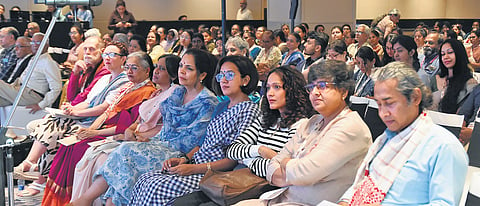

CHENNAI: The dictionary has a meaning for the word ‘inclusion’. But for a 19-year-old autistic adult, inclusion is “…when people become interested in my thoughts and opinions. I liked to be accepted as more than my autism and not to be included just for keeping up appearances.”
Neurodivergence doesn’t make an individual any lesser. Instead, they need a space of their own to thrive. A world that sees everything as black or white, tends to forget or rather ignore to see the many shades and the uniqueness of each.
The world is trying to provide a conducive environment for neurodivergent individuals now. But a few decades ago, many such individuals were shunned from a world that other children experience. In 1999, Sankalp took form to educate children and young adults with Autism Spectrum Disorder, Specific Learning Disabilty (SLD) and Intellectual and Developmental Disability (IDD).
The school that started with 10-15 students, now, provides for approximately 250 children, and have secured a place in the list of best schools in India. It celebrated its 25th anniversary over the weekend by holding their two-day biennial international conference Learn ’24 —‘Neurodiversity Matters’, a conference on inclusion and empowerment.
Drafting steps
With pride in their tone, Sulata Ajit and Lakshmi Krishnakumar, founders and directors, S, Sankalp Trust, reminiscence on the genesis of the school and say that ‘Sankalp’, a Sanskrit word, means commitment, purpose, will. The school acknowledges that the emotional background of a student is quintessential in understanding the students’ behaviour. The students who had completed schooling from this school are now excelling in the field they chose to work.
The event witnessed the launch of India Inclusion Research Network (IIRN), a forum that promotes and mentors researchers in the field of disability rehabilitation with specific focus on inclusion. Sankalp and IIRN plan to collaborate in the future to do research in the areas of inclusion. Prof Himangshu Das, member secretary of IIRN, presented the highlights of the draft, emphasising the agenda.
The chief guest MK Narayanan, Former National Security Advisor, and former governor of West Bengal, spoke on the need for a perspective shift. “Often, the individuals with disability are defined by their disability rather than their ability.” He noted and stressed that their potential must be nurtured and not overlooked.
Richard Rose, professor Emeritus, University of Northampton, UK, one of the key speakers, took quite a different approach by addressing the audience through poem titled The Village Pump. Saying that the disparity in the availability of resources like water among the humans is vast, he implied that the needed resources for children with disability is scarce for many. Laying the foundation of the address, he pressed on the fact that external factors like poverty, government preventives, geography, language, conflict and war, needed to be taken into account while understanding the access and ensuring inclusion.
From personal diaries
A parent’s narrative of looking at the child’s disability and above all, looking at the child, swathed the audience with layers of warmth and understanding. Chitra Paul, co-founder and director of All Inclusive Foundation; and co-ordinator faculty at KPAMRC/KPACIDD, Bengaluru, took the audience through the life of her non-speaking autistic child.
Her presentation ‘Navigating Incluisve Education for People with Diverse Needs: from theory to practice-A parent’s experience’, was filled with the experiences of rejections from educational institutions, comfort from teachers, the space schools and teachers provided, and how his needs were intuitively met by his compassionate mentors. Recollecting a memory of her son playing piano for a school programme, she said “After seeing Tarun’s (her son) performance on the stage, I had tears in my eyes, I was awestruck.”
While there was a silence punctuated with heightened emotions, Dr Gitanjali G Govindrajan opened the windows to new contexts and perspectives. The founder and executive director of Snehadhara Foundation; and programme director and practitioner, Art Practices for Inclusion-India and Overseas, in her talk titled ‘Harmony in Diversity:
Embracing Neurodiversity through Artistic Expression’, dived deep into the denotations and connotations, highlighting the importance of arts in the lives of neurodivergent individuals, and underscoring that the process involves feeling with all senses and evoking emotions in them. She emphasised on the unwanted notion of learning it all and said, “We need to know what the child needs to know.”
Meanwhile, ‘Needs, Abandonment and Coregulation in Neurodiversity’ by Aarti C Rajaratnam, who is also a psychologist and an author, focused on the levels of learning, addressed the grey areas needs attention. With the advent of technologies for the individuals with neurodiversity, many activities become less challenging. Infrastructural aids are one of the ways for making them lead an independent life.
Robin Tommy, founder and chief digital advisor, Inclusys, stressed on the need-based collaborations between corporates and organisations in developing assistive technology. He explained how some of their assistive applications like VHab and ASSISTO are helping individuals with cerebral palsy lead a better life.
The word inclusion hasn’t seeped deep when it comes to curriculum — the disparities in it, the high-cost specialised service and comorbidities. Highlighting the scenario in India, Himangshu Das talked on ‘Inclusion of people with Neurodiversity: A myth or reality in India’.
On Sunday, Beverly Louis, co-founder, Mann-Center for Individuals with Special Needs, Mumbai; Dr Shiva Prakash Srinivasan, HOD, Clinical Services and Training, Department of Youth Mental Health Schizophrenia Reserach Foundation (I); Dr Susan Elias, founder and chief innovation officer, Daira Edtech &MED×AI Innovations; and Dr Orla Slattery, inclusion co-ordinator for adults with ID, Department of Educational Psychology, Mary Immaculate College, Limerick Republic of Ireland, took to the stage. The valedictory function had singer Bombay Jayashri Ramnath as the chief guest.
The two-day event was an attempt to navigate through the possibilities and a break away from the one-size fits all solutions especially in the different kinds of disorders in the wide spectrum of neurodivergence.